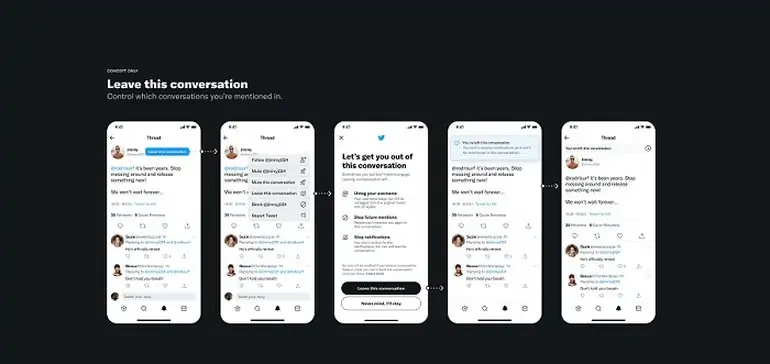Mobile App Development, SEO, Social Media, Uncategorized, Web Development, Website Design
Twitter is Testing a Range of New Control Options, Including Auto-Archiving Old Tweets and Hiding Likes
- By Brett Belau
07 Sep

Twitter is considering a range of new features designed to provide more protection and control for users, giving you more capacity to manage your in-app interactions and protect your content, in order to avoid being held to account for outdated views that you may have shared.
As reported by Bloomberg, Twitter is considering the new additions to help users feel more open in the app, without fear of judgment and criticism.
Among features being considered, according to Bloomberg’s report, are:
- Archive old tweets – This option would enable users to archive their old tweets after a certain period of time so that they’re no longer visible to others. Users would be able to manually set a time as to when the archive would kick in, with 30, 60, and 90-day thresholds, or hiding tweets after a full year, being tested as potential options.
- Remove individual accounts as followers – This has recently been spotted in testing, with Twitter working on an option that would enable users to remove specific profiles from their Follower list, without having to use the current block and unblock workaround. That could make it a less confrontational way to avoid certain users in the app.
- Remove yourself from a conversation – Also spotted in testing last month, this option would enable users to untag themselves from any discussion, and keep them from being mentioned again within that thread. The option was originally called ‘unmention yourself’, but Twitter says that the updated wording better clarifies what the function is.

- Hiding tweets that you’ve liked – Likes have always been a little confusing for Twitter users, with some seeing them as a level of endorsement, and others using them as a marker of things they want to read later, or similar. By hiding your liked tweets, that could remove any confusion, while also letting users feel more free in what they do on the platform, without consideration of judgment for such.
Which is the real focus of all of these updates – Twitter wants to give users more options to feel free and open in how they share and engage on the platform, without fear of being torn down by Twitter mobs or having their old comments come back to haunt them, which may cause people to hold back on posting tweets and engaging in the comments.
Because that can be a problem. As we’ve seen with various high-profile cases, your past, ill-advised tweets can come back to haunt you, and can be used against you, particularly if you end up taking on a prominent, public-facing role.
Film director James Gunn, for example, lost his job as director of the ‘Guardians of the Galaxy’ sequels back in 2018 after his old tweeted remarks were re-surfaced, while just recently, newly appointed ‘Jeopardy’ host Mike Richards was fired after offensive remarks he’d made in the past were discovered, make his position untenable.
The short, sharp nature of Twitter, aligned with real-time response, can be perfect for those off-the-cuff, in-the-moment replies and comments, but cases like these highlight the dangers of such, and that could make more people more hesitant to share in the app, which could be limiting further tweet engagement.
That’s why Twitter tried out ephemeral Fleets as a less binding way to share your thoughts in the app, and a timed auto-delete option for your tweets would also align with this.
Along a similar line, Twitter has also added a new ‘Safety Mode’ option this week, which aims to offer a level of protection from tweet pile-ons and ‘Cancel Culture’, which can also cause people to be more hesitant about sharing their thoughts in the app.
Essentially, Twitter wants users to comment and engage as much as possible, and elements like these are an impediment to that, which is why it’s now exploring new ways to help users feel more free in what they tweet, while also giving people more ways to avoid the more negative elements, and ending up unwitting targets of abuse and scorn in the app.
Will that work?
Certainly archiving tweets makes sense – though there is always the Wayback Machine and other resources that will help online sleuths uncover old comments, if they really want to look.
But it could provide another level of assurance for users, and a better sense of freedom – because yes, some of the dumb things we tweeted in years past will be just that; dumb, ill-informed opinions that we’ve now moved past, as part of our evolution and education, which really should be commended, rather than used as a bat to beat you with.
This is especially true for younger people, who’ve grown up online, and have gone through their upbringing with social media as an outlet. People are going to have posted stupid things, which, in retrospect, they’ll wish that they hadn’t.
An auto-archive option would definitely provide benefit in this respect, while more controls over who follows and mentions you, and removing Liked tweets from view, also seem like potentially helpful, beneficial considerations.
Source: www.socialmediatoday.com, originally published on 2021-09-02 15:14:37
Connect with B2 Web Studios
Get B2 news, tips and the latest trends on web, mobile and digital marketing
- Appleton/Green Bay (HQ): (920) 358-0305
- Las Vegas, NV (Satellite): (702) 659-7809
- Email Us: [email protected]

© Copyright 2002 – 2022 B2 Web Studios, a division of B2 Computing LLC. All rights reserved. All logos trademarks of their respective owners. Privacy Policy

![How to Successfully Use Social Media: A Small Business Guide for Beginners [Infographic]](https://b2webstudios.com/storage/2023/02/How-to-Successfully-Use-Social-Media-A-Small-Business-Guide-85x70.jpg)



![How to Successfully Use Social Media: A Small Business Guide for Beginners [Infographic]](https://b2webstudios.com/storage/2023/02/How-to-Successfully-Use-Social-Media-A-Small-Business-Guide-300x169.jpg)


Recent Comments